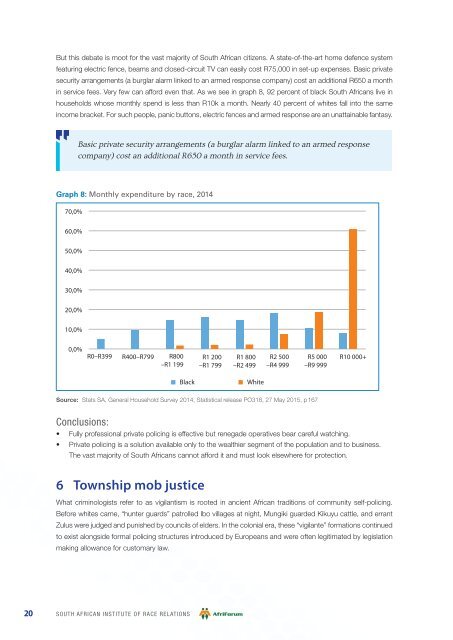2230_SAIRR_WWACinSA_sm4.indd 1 2016/09/05 5:04 PM
sairr_english_wwacinsa_print_050916
sairr_english_wwacinsa_print_050916
You also want an ePaper? Increase the reach of your titles
YUMPU automatically turns print PDFs into web optimized ePapers that Google loves.
But this debate is moot for the vast majority of South African citizens. A state-of-the-art home defence system<br />
featuring electric fence, beams and closed-circuit TV can easily cost R75,000 in set-up expenses. Basic private<br />
security arrangements (a burglar alarm linked to an armed response company) cost an additional R650 a month<br />
in service fees. Very few can afford even that. As we see in graph 8, 92 percent of black South Africans live in<br />
households whose monthly spend is less than R10k a month. Nearly 40 percent of whites fall into the same<br />
income bracket. For such people, panic buttons, electric fences and armed response are an unattainable fantasy.<br />
Basic private security arrangements (a burglar alarm linked to an armed response<br />
company) cost an additional R650 a month in service fees.<br />
Graph 8: Monthly expenditure by race, 2014<br />
70,0%<br />
60,0%<br />
50,0%<br />
40,0%<br />
30,0%<br />
20,0%<br />
10,0%<br />
0,0%<br />
R0–R399 R400–R799 R800<br />
–R1 199<br />
R1 200<br />
–R1 799<br />
R1 800<br />
–R2 499<br />
R2 500<br />
–R4 999<br />
R5 000<br />
–R9 999<br />
R10 000+<br />
Black<br />
White<br />
Source: Stats SA, General Household Survey 2014, Statistical release PO318, 27 May 2015, p 167<br />
Conclusions:<br />
• Fully professional private policing is effective but renegade operatives bear careful watching.<br />
• Private policing is a solution available only to the wealthier segment of the population and to business.<br />
The vast majority of South Africans cannot afford it and must look elsewhere for protection.<br />
6 Township mob justice<br />
What criminologists refer to as vigilantism is rooted in ancient African traditions of community self-policing.<br />
Before whites came, “hunter guards” patrolled Ibo villages at night, Mungiki guarded Kikuyu cattle, and errant<br />
Zulus were judged and punished by councils of elders. In the colonial era, these “vigilante” formations continued<br />
to exist alongside formal policing structures introduced by Europeans and were often legitimated by legislation<br />
making allowance for customary law.<br />
20<br />
SOUTH AFRICAN INSTITUTE OF RACE RELATIONS<br />
<strong>2230</strong>_<strong>SAIRR</strong>_<strong>WWACinSA</strong>_<strong>sm4.indd</strong> 20<br />
<strong>2016</strong>/<strong>09</strong>/<strong>05</strong> 5:<strong>04</strong> <strong>PM</strong>


